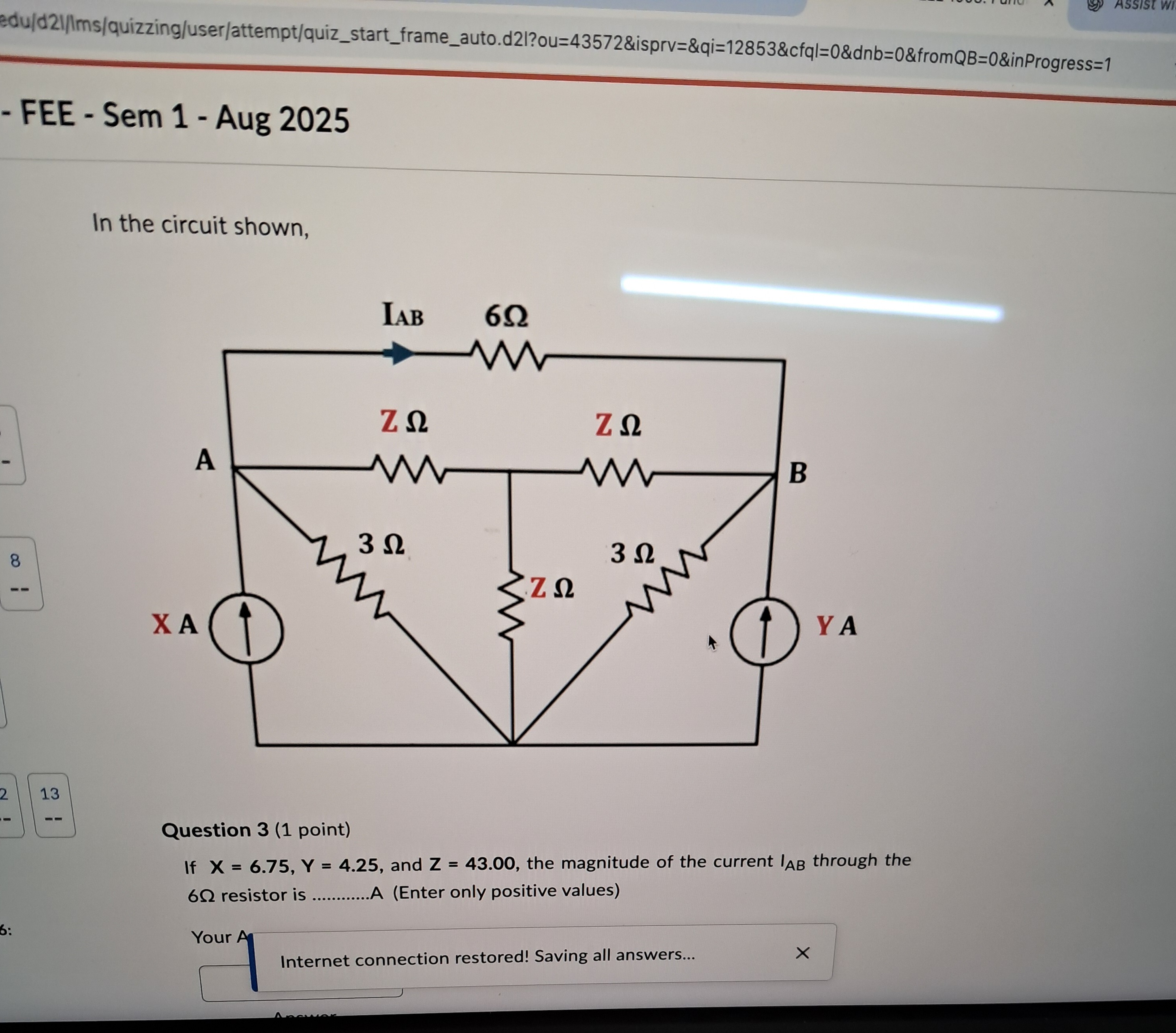Question
Question: In the circuit shown, If X = 6.75, Y = 4.25, and Z = 43.00, the magnitude of the current $I_{AB}$ t...
In the circuit shown,
If X = 6.75, Y = 4.25, and Z = 43.00, the magnitude of the current IAB through the 6Ω resistor is .................A (Enter only positive values)

0.60
Solution
To solve this problem, we will use nodal analysis. Let the potential at the bottom common line (Node D) be the reference node, so VD=0 V. Let the potentials at nodes A, B, and C be VA, VB, and VC respectively.
The given values are: X = 6.75 A Y = 4.25 A Z = 43.00 Ω
1. Kirchhoff's Current Law (KCL) at Node A:
The current X enters node A. The currents leaving node A are through the 6Ω resistor (to B), the ZΩ resistor (to C), and the 3Ω resistor (to D).
X=6VA−VB+ZVA−VC+3VA−VD
Since VD=0:
6.75=6VA−VB+43VA−VC+3VA
To eliminate denominators, multiply the entire equation by LCM(6,43,3)=258:
6.75×258=43(VA−VB)+6(VA−VC)+86VA
1741.5=43VA−43VB+6VA−6VC+86VA
1741.5=(43+6+86)VA−43VB−6VC
1741.5=135VA−43VB−6VC (Equation 1)
2. KCL at Node B:
The current Y enters node B. The currents leaving node B are through the 6Ω resistor (to A), the ZΩ resistor (to C), and the 3Ω resistor (to D).
Y=6VB−VA+ZVB−VC+3VB−VD
Since VD=0:
4.25=6VB−VA+43VB−VC+3VB
Multiply by 258:
4.25×258=43(VB−VA)+6(VB−VC)+86VB
1096.5=43VB−43VA+6VB−6VC+86VB
1096.5=−43VA+(43+6+86)VB−6VC
1096.5=−43VA+135VB−6VC (Equation 2)
3. KCL at Node C:
There are no current sources connected to node C. The sum of currents leaving node C must be zero. The currents leave through the ZΩ resistors to A, B, and D.
ZVC−VA+ZVC−VB+ZVC−VD=0
Since VD=0:
43VC−VA+43VC−VB+43VC=0
Multiply by 43:
(VC−VA)+(VC−VB)+VC=0
3VC−VA−VB=0
VA+VB=3VC (Equation 3)
Now we have a system of three linear equations:
- 135VA−43VB−6VC=1741.5
- −43VA+135VB−6VC=1096.5
- VA+VB=3VC⟹VC=3VA+VB
Substitute VC from Equation 3 into Equation 1:
135VA−43VB−6(3VA+VB)=1741.5
135VA−43VB−2(VA+VB)=1741.5
135VA−43VB−2VA−2VB=1741.5
(135−2)VA−(43+2)VB=1741.5
133VA−45VB=1741.5 (Equation 4)
Substitute VC from Equation 3 into Equation 2:
−43VA+135VB−6(3VA+VB)=1096.5
−43VA+135VB−2(VA+VB)=1096.5
−43VA+135VB−2VA−2VB=1096.5
(−43−2)VA+(135−2)VB=1096.5
−45VA+133VB=1096.5 (Equation 5)
Now we have a system of two equations with two unknowns (VA,VB): 4. 133VA−45VB=1741.5 5. −45VA+133VB=1096.5
We need to find the current IAB through the 6Ω resistor, which is given by IAB=6VA−VB.
To find (VA−VB), subtract Equation 5 from Equation 4:
(133VA−45VB)−(−45VA+133VB)=1741.5−1096.5
133VA−45VB+45VA−133VB=645
(133+45)VA−(45+133)VB=645
178VA−178VB=645
178(VA−VB)=645
VA−VB=178645
Now, calculate IAB:
IAB=61×(VA−VB)
IAB=61×178645
IAB=1068645
Calculate the numerical value:
IAB≈0.6039325842696629 A
Rounding to two decimal places, as consistent with the input values:
IAB≈0.60 A
The question asks for the magnitude and to enter only positive values. Our result is positive.
The final answer is 0.60.
Explanation of the solution:
- Define node voltages (VA,VB,VC,VD) and set VD=0 V (ground).
- Apply Kirchhoff's Current Law (KCL) at nodes A, B, and C to form a system of linear equations.
- KCL at A: Sum of currents leaving A equals current entering A (X).
- KCL at B: Sum of currents leaving B equals current entering B (Y).
- KCL at C: Sum of currents leaving C equals zero (no current sources).
- Simplify the equations by substituting the given values of X, Y, and Z.
- Solve the system of equations. From KCL at C, express VC in terms of VA and VB.
- Substitute the expression for VC into the KCL equations for A and B, reducing the system to two equations with two unknowns (VA,VB).
- Solve for (VA−VB) from the two-variable system.
- Calculate the current IAB using Ohm's Law: IAB=6VA−VB.
